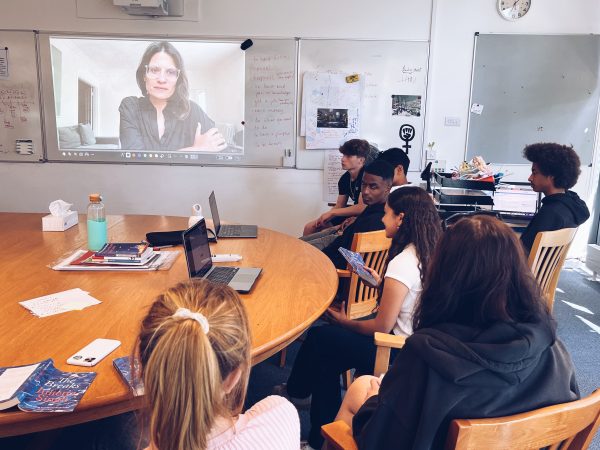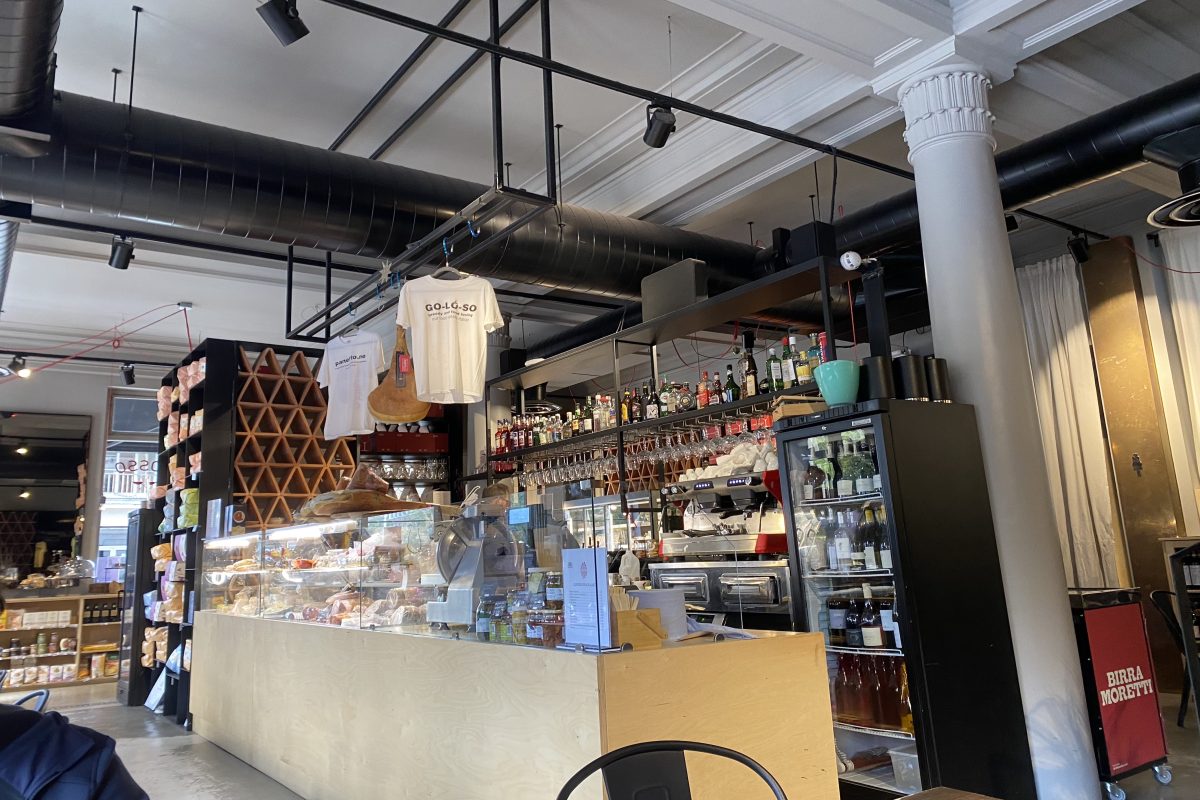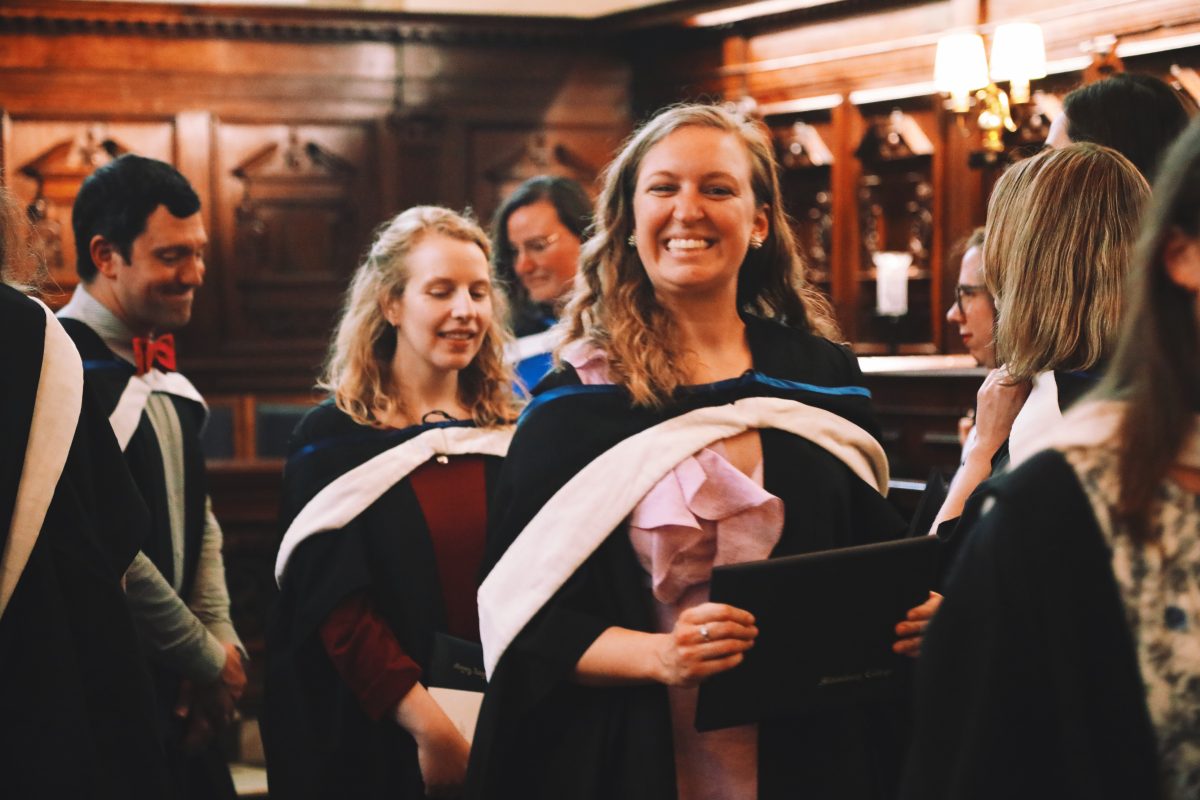English Teacher Phoebe Krumich spent the majority of her youth steering clear of becoming an educator. Nonetheless, the path to teaching had an inescapable pull.
“Both of my parents are teachers and basically everyone in my family is a teacher, so I kind of was trying to avoid being a teacher, actually,” she said. “Even when I went to college, I thought I wasn’t going to be a teacher.”
It wasn’t until Krumich served as a consultant for the Writing Center at the University of Richmond, where she earned her Bachelor of Arts degree in English Language and Literature, that she explored the possibility of a career in education. Krumich said working with an English as a foreign language student was a particularly powerful connection as she was able to bring the ideas the student “so clearly had” but had “totally developed in another language” into English, uncovering her love for teaching.
“[She] was so brilliant and capable but was really struggling with her professors’ pretty narrow expectations for her,” she said. “Now I look back and see that they weren’t really sort of meeting her where she was, and she was incredible.”
Specifically, Krumich said helping develop this student’s writing underscored the value of teacher-student relationships.
“I felt like I was sort of like a participant, but this sort of facilitator of her own brilliance rather than sort of somebody who was collaborating,” she said. “It felt like a partnership, but one in which I could really allow another person to show their gifts and hone them.”
Krumich said her experiences with the Writing Center are what ultimately shifted her view on her future profession.
“I told my mom, I was like, ‘I just, I can’t think of any job I really, really am invested in or really want to be, but I just want to be a writing consultant forever,’ and she was like, ‘You know that sounds a lot like teaching, right?’” Krumich said. “I kind of realized it backwards by loving the act of it, not sort of planning to do it and then trying it out.”
Although Krumich knew she was “always going to do something with English and writing,” she originally began her undergraduate degree as an International Relations major before eventually studying English. She said majoring in English allowed her to view the world in a way she could greatly appreciate.
“So many of the things that felt really abstract and like we were sort of treating people as numbers in different ways felt so much more explained and clear and meaningful to me in my literature class,” she said. “It just felt like a different way of approaching similar questions about how the world is shaped and organized, and so I really valued that.”
Krumich’s favorite class from college was a Women in Modern Literature course she took in her first year, primarily due to her influential professor, Julietta Singh.
“She made us call her by her first name…she told me to become an English major,” Krumich said. “She actually taught me Post-colonial literature, which I now teach here.”

She said it was this Women in Modern Literature class that truly ignited her passion for English, ultimately leading her to switch her major.
“That was when I think I learned not just how much I loved literature, but that there could be an urgency and a purpose to literature,” she said. “There were stories that we needed, rather than just stories that we could enjoy, and that maybe the best literature serves a purpose, even though that’s not what it’s for exactly.”
Now that Krumich teaches Post-colonial Literature at ASL, she said Singh is able to speak to her classes through Zoom, which she said feels “so full circle.”
“I’m getting to share my greatest teacher with my own students,” Krumich said. “We read one of her books actually in that class, so she had a really profound effect on me and still does.”
Moreover, Krumich took two Indigenous Film and Literature classes while completing her undergraduate degree, which she said she was “floored by.”
“They were taught by this amazing Polish woman professor who would always make fun of us Americans for not knowing anything about our own history,” Krumich said. “It has led to a lot of personal study and growth around what it means to be a settler of the United States and ongoing settler.”
During the first semester of her junior year of college in 2012, Krumich studied abroad in Dakar, Senegal to supplement her French minor.
“I wanted to go somewhere I hadn’t been before,” she said. “My parents have never been anywhere other than Europe, and I think that’s the kind of limiting view that I don’t really wish for myself, and so I think sort of inadvertently, I didn’t realize I was going to do this, but it just really so broadened my thinking on race and colonization.”
After graduating, Krumich returned to teach at her old high school in Virginia where, in addition to teaching, she acted as the assistant theater director. She said there were months where she “just never saw the sun” because of how much she was working. Krumich said she then recognized the importance of teaching while prioritizing her individual learning, too.
“I just started to feel like I was only investing in the interests and gifts of other people and my students,” she said. “I think that didn’t feel fair to them either because they didn’t want to suck me dry, but I was feeling really depleted. At that point, I actually took up the cello, and it wasn’t this like, ‘Oh, I’m gonna take on this nice hobby.’ It was like, I was full of rage. I was like, ‘I’m gonna learn something for myself.’”
Krumich said this teaching experience led her to focus on prioritizing her well-being in future jobs.
“That’s the hardest part of teaching is just a balance, always, and it’s not so much like work-life balance, it’s like self-others balance,” she said. “Students need adults who are engaged in their own lives and excited about living in the world, and so I’m trying to bring that to my teaching.”
In order to further her studies, Krumich enrolled in the Middlebury College Bread Loaf School of English master’s program in 2017, known for its distinctive format that convenes exclusively during the summer at various campuses across the U.S. and U.K, accommodating full-time teachers. Krumich said she had long envisioned pursuing a master’s degree as her “next step,” but thought she would struggle to balance her job and the rigor of a traditional master’s program.
“It sounded like something that would be enriching rather than just a sort of tick mark on my resume,” she said. “I wanted to keep learning and I wanted to learn from other English teachers,… and it just seemed fun because you got to go to these different campuses in different places and that did end up being a real highlight.”
During her second year of the program, Krumich studied in Vermont, which she described as a slightly “cult-like” campus with a frat guy culture characterized by “young, male English teachers and their lacrosse sticks.”
“It’s like the biggest [campus] and there’s like hundreds of English teachers and it’s just like, it’s just really intense,” she said. “I enjoyed it, but because I’d started at the Santa Fe one with a smaller group I kind of preferred that, but the Vermont one was special too.”
Furthermore, in spite of the COVID-19 pandemic in 2020, Krumich was still able to complete her Bread Loaf class through an independent project. Throughout the summer, she wrote a play and would Zoom with her professor to read the characters’ parts and receive feedback.
“At the end, she brought in some actor friends and they did a reading of it,” she said. “It was really special.”
Throughout her time at Bread Loaf, Krumich took classes on teaching and enjoying poetry, decolonization in literature, using theater in the classroom and disability literature and Shakespeare, among others.
After studying in Middlebury, Vermont, Monterey and Oxford and taking two summers off, Krumich graduated in 2023, completing a seven-year journey.
“It was a long haul, but one of the things I really loved about that is that we so often think about things that are done slowly as, you know, being problematic or being needing to speed up,” she said. “I found that having education slowly in this way allowed me to really absorb what I was learning and to feel so much more purpose with it.”
In addition to gaining technical writing skills, Krumich said her experience at Bread Loaf sparked personal development, shaping her understanding of what it truly means to be a writer.
“I’ve been a little bit afraid to be a writer for a long time,” Krumich said. “In one of my classes at Bread Loaf, I remember not quite owning the word ‘writer’ and a professor saying, ‘You’re a writer, and there’s so many English teachers and people who love writing who are afraid to say that they’re writers, and you got to get past that, you know, you got to claim it.’”
At ASL, Krumich teaches both the Post-colonial Literature elective, which she designed, and the Dramatic Literature and Performance elective, as well as English 10. She said she loves the one-semester elective system for Grade 11 and 12 students as it enables classes to explore a specific subject matter in-depth.
With the Dramatic Literature and Performance elective, Krumich said its flexibility and uniqueness is what makes it so exciting to teach since she bases the curriculum around what plays are currently performing in London. Each semester, the class attends around five productions.
“For the most part, it is all entirely bespoke for that particular semester, and so there’s something really motivating and exciting and individualized about that,” she said. “And, of course, it’s just really fun to get out onto London theaters with students.”
Ultimately, Krumich said she cherishes the relationships she cultivates in the classroom, as she finds fulfillment in her role as an encourager of self-expression and individuality.
“I think all students really thrive when they know that their voice and what they care about is shared by their teacher,” she said. “It’s so special to have a role where I get to bring so much of myself, but yet allow other people to really shine and bring so much of themselves.”













MM • Feb 22, 2024 at 9:27 pm
Wow, this is beautifully written. Really captures Ms. Krumich’s essence through skillful storytelling. Great choice to write about this special teacher.